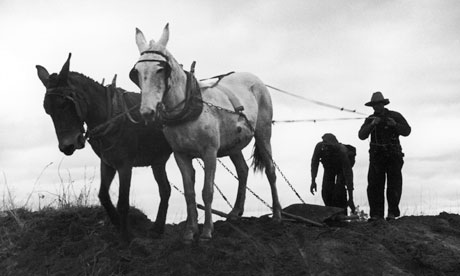
When he is not writing novels, or short stories, or poems, Ron Rash is the Parris distinguished professor of Appalachian cultural studies at Western Carolina University. He is 58, and justifies every syllable of that title with stories that seem to have been dug out of the hard land in which he has always lived. After years of excavating the fictional ground beneath his feet, Rash lately and deservedly seems to have struck paydirt.
His most recent novel, Serena, was a bestseller in the US and is soon to be released as a film, starring Jennifer Lawrence as the barren wife of an Appalachian landowner who seeks murderous revenge on her husband's illegitimate son. In 2010, Rash's story collection, Burning Bright, won the Frank O'Connor award, and mined a similar seam of almost Old Testament-type drama, which – not surprisingly – drew comparison with the sandblasted sentences of that other southern myth-maker and doom-dealer, Cormac McCarthy.
The Cove begins with this tone, too, and never lets up. In the prologue, an official from the Tennessee Valley Authority stops at a deserted farm and cranks up an old well handle in the hope of a drink of water. When the brackish water in the bucket clears, he is looking into the eye sockets of a human skull. The story behind that skull takes us back to 1917 and on to the last months of the first world war, the reverberations of which are felt even up in these mountains.
Hank Shelton, who has lost an arm in the European conflict, and his sister, Laurel, who lost her father and fended for herself while her brother was away, are trying to resurrect the Cove, a smallholding that locals believe to be cursed. The curse seems to extend even to the Shelton siblings and they are mostly shunned by local society for the bad luck they carry. One day, working near the river, Laurel sees a bedraggled stranger, apparently mute, camped on the far bank. The stranger's only possession is a fine flute, on which he plays entrancing classical melodies, the like of which Laurel has never heard.
In the weeks that follow, the stranger, Walter, becomes part of the life of sister and brother in ways that they could hardly imagine; there is a love story between Laurel and her mute musician, one that rarely promises a happy ending. The war, in the shape of government agents seeking illegal aliens, comes knocking once again at the cursed Cove, in surprising and tragic ways.
It is Rash's way with language, though, which prevents his ballad-like tale ever threatening to be simple melodrama. His sentences unfold in unusual and often beautiful ways, dwelling on the regional language, its rootedness in the rhythms of daily life. There are a lot of passages like this in his novel and you don't tire of them: "After Hank left, Laurel washed the cups and dishes and flatware, filled the gray berlin kettle with pole beans and set it on the stove to simmer. She went to the sink, sifted soda powder on her toothbrush and brushed her teeth before she tied her hair back with a crimped hairpin."
In Rash's stately prose, you are constantly made aware of the care that brother and sister take in their chores by the care that the author takes in placing one word beside the next. He appears to derive quiet, almost religious, pleasure in descriptive clarity, so that sentences become little paradigms of the events they describe. This is Hank and Walter making a fence: "When the tone of the metal staple entering the fourth post deepened, Hank moved to the next end post, set his knee against the wood, and pulled downward with the crowbar until the wire was taut."
That kind of semantic and syntactical tautness runs right through this novel, the stretched wire of Rash's narrative linking regular fenceposts of solid observation, and it makes the tragic ending all the more affecting.
The Cove is a short story writ large, in a way, following a single strand of love and loss, fossicking at a neglected moment of American history; but because of its simplicity, the hard-won elegance of its telling, it stays singularly in the mind after it has finished.

